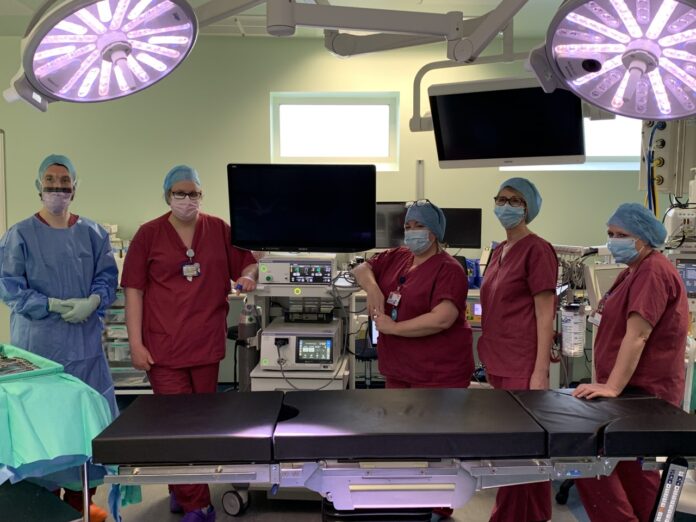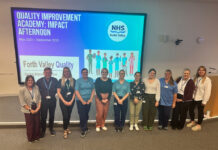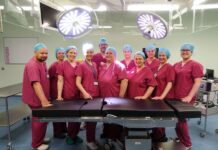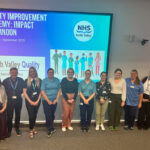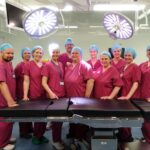Sustainability has become a major priority as the Scottish Government sets stiff targets in a bid to try to combat climate change. Reducing waste, conserving energy at home and in the workplace, making changes to how we travel, and looking more carefully at what we buy are some of the recommendations to try to reach net zero emissions by 2040.
Currently, Health Boards across Scotland are ramping up climate and environmental action and, while the Scottish Government say they are encouraged at signs of progress, there is still some way to go. So, what exactly is happening here in NHS Forth Valley?
GREEN THEATRES
One of our biggest areas of current work is the Green Theatres project where nurses have been leading on a number of projects. A notice board at the entrance to theatres records nurse-led projects and what stage they are at, to help celebrate and disseminate the knowledge and success gained.
Operating theatres are the biggest users of energy and producers of waste within the service so getting them as green as possible is vital. More than 170 nurses are employed directly within the department, and they are often the biggest source of ideas, solutions and enthusiasm.
Examples include sourcing washable individual theatre hats, a surgical fluid disposable system that means liquid waste is processed on site and disposed via the sewage system rather than all of it being treated as clinical waste, cleanable pressure point pads, change of supplier for an intra-ocular lens insertion system using less packaging, checklists to ensure computers and lights are switched off at the end of lists, disconnecting the scavenging system out of hours, facilitating oral pre operative paracetamol rather than intravenous doses and segregating as much non clinical waste as possible.
All of these are resulting is significant reductions in energy usage, waste quantities and almost always financial savings as well. There are even extra supplies in the coffee room from ‘selling’ drinks cans back to one of the deposit return scheme shops.
They also build on the previous efforts of local theatre staff to reduce their carbon footprint and help save the planet by discontinuing the use of anaesthetic gases which contribute to global warming, reducing the amount of waste which requires to be incinerated or heat treated and cutting back on cardboard waste. You can read about previous successful theatre initiatives here.
Every single one of these ideas has come from frontline staff seeing and questioning the status quo….is there a better or greener way of doing something? Almost always the answer is yes.
WASTE NOT WANT NOT
Over the past 18 months, there have been several initiatives to reduce food waste at Forth Valley Royal Hospital.
Milk, bread, porridge, fruit juice and fruit were previously part of a standing order for wards with the same amount being sent every day. But a lot was returned to the kitchen untouched resulting in unnecessary food waste.
A decision was made to add milk, fruit and bread to the ward provisions. This meant the ward or ward housekeeper could check what was needed the following day and order from ward level. If the order proved to be insufficient a quick phone call to the kitchen would replenish supplies, by either delivering to the ward or adding supplies to the next food trolley, depending on local needs.
A large quantity of porridge was also being returned uneaten. Patients are now asked the night before if they wish porridge for breakfast. In the first 10 months of the change being in place porridge waste was reduced by 734kg on average each month. And fruit is now sliced in bags with patients finding apple slices more appetizing than a whole apple. These bags are now in every ward and available as a ward snack.
Meanwhile coffee grounds, a great fertiliser for growing plants, are now on offer to staff and visitors in the restaurant, Starbucks and the RVS cafe. Previously added to food waste, this new venture has reduced coffee ground waste on average by 57kg a month.
Claire Reekie is now Serco’s Green Ambassador. In this role she has set up a monthly meeting with the Serco Contract Manager, General Managers, and Service Managers across the hospital to discuss any future green initiatives and help drive them forward.
FIGHTING FIT ON AN eBIKE
Two nurses within the bowel cancer team, Linnet McGeever and Lindsey Straiton, identified from available evidence that the fitter patients were before surgery, the better their outcomes after surgery. They have less complications, recover faster and are discharged earlier than those who are not as physically active.
The nurses, working in partnership with multidisciplinary colleagues, set up a pilot project to incorporate the benefits of physical activity into a patient’s journey. They also included guidance and support to stop or reduce smoking, cut down on alcohol and eat more healthily.
Working with Forth Environment Link (FEL), Health Improvement, the Sustainable Travel Manager and Edinburgh University academics, the pilot focused on testing the impact to their patients of having free, long-term access to an eBike and wrap around support. Both nurses talked to their patients about the opportunity to cycle with a new eBike, both before and after their operations.
This exemplar partnership work was funded from Paths for All Smarter Choices, Smarter Places Open Fund and both nurses were instrumental in driving the success of the pilot project from start to finish.
eBikes are a great way to overcome some of the common barriers to cycling and cycling is an easy activity to build into everyday life. The pilot included tailored support from FEL colleagues and ebikes were fitted with GPS trackers to monitor the progress of each patient.
This project met eight sustainable development goals. One example of the success of the pilot was a patient who wasn’t previously active, who took up the offer of an eBike and cycled 1,971 kms in 11 months!
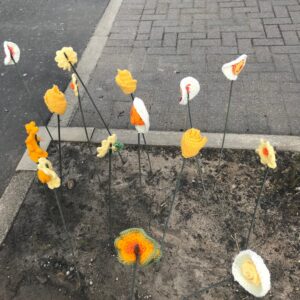 NO MOW MAY
NO MOW MAY
An area of grass at Stirling Health and Care village remained uncut in May as part of bid to encourage pollinators, including bees and butterflies who feed on plants through the summer. The scheme known as No Mow May, is the brainchild of Plantlife, an international conservation charity working to secure a world rich in wild plants and fungi.
The blossoming grassroots movement towards wilder lawns and grassy areas benefits spring wild plants as they are able to set seed before being felled by mower blades. A greater diversity of roots has the potential to improve the carbon capture potential of soil beneath our lawns by as much as 10%, equivalent to 20 million tonnes of carbon dioxide. This is similar to the domestic annual emissions for heavy goods vehicles in the UK.
While Plantlife encourages nature lovers to participate in No Mow May, guidance does not suggest that you should stop continue to stop mowing after May. Plantlife botanists recommend a balanced approach to lawn care throughout the year with collection of the cuttings.
Mark Schofield, Road Verges Advisor at Plantlife, commented: “The removal of cuttings is crucial to encouraging plant diversity. When cuttings are left to rot down on lawns, this enriches the soil and creates an environment where more competitive grasses and species like nettles, hogweeds and thistles take over, smothering the rest of our wild flora.”
Andrew McGown, NHS Forth Valley’s Head of Estates, added: “We are currently trialling No Mow May in an area at the Stirling Health and Care Village and the plan is to expand out to more sites over time. Sustainability and the climate emergency is a major focus for our Department and for society in general. This is a great initiative, and we would encourage staff and patients to get involved too.”
Until wild flowers start appearing, knitted and crochet flowers on wires have been ‘planted’ to provide pops of colour.
